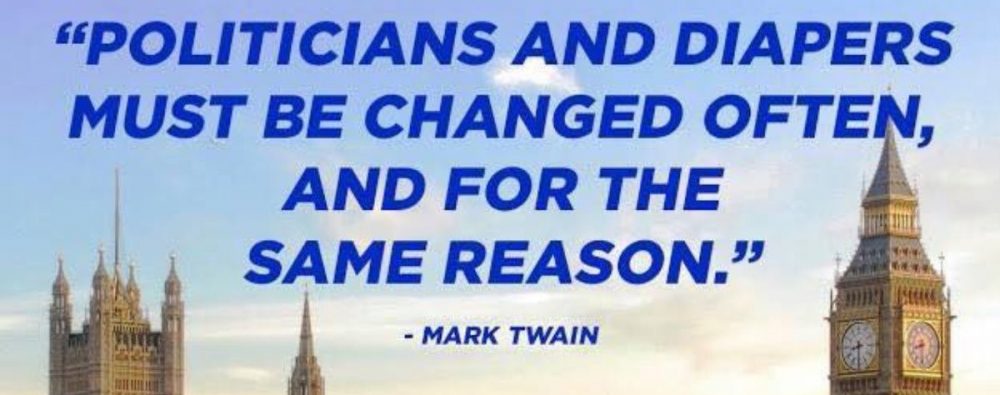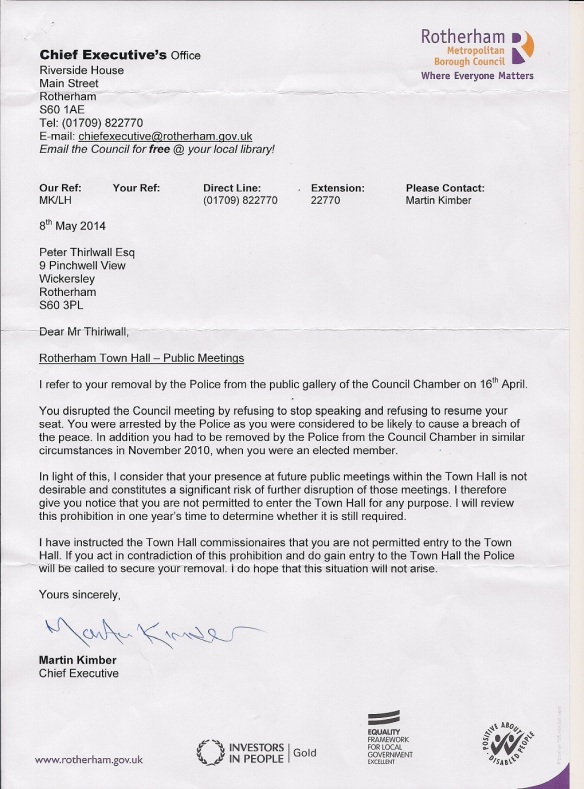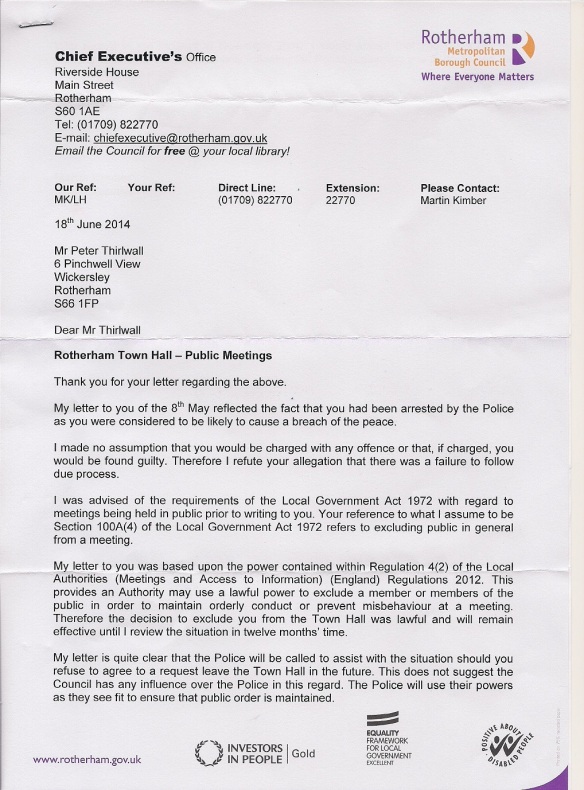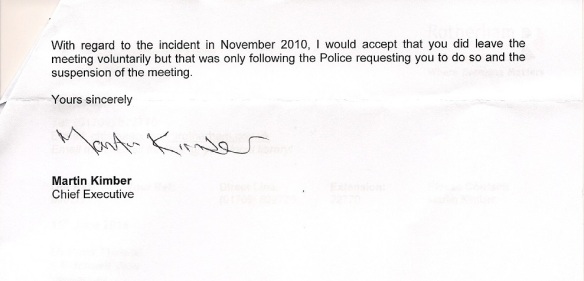Rotherham Politics readers like thought puzzles, they perhaps don’t come more interesting than this particular piece of the employment of incorrect facts to justify the unjustifiable.
Below is the correspondence between Martin Kimber and Peter Thirlwall following Peters withdrawal from the Council meeting of 16th April. They appear in date order. There is some bureaucratic, lawyerly, ‘swerve ball’ going on here, can readers identify the flaws in Kimber’s argument?
.
The Chief Executive,
Rotherham Borough Council.
Rotherham Town Hall
Public Meetings
Mr Kimber,
I am in receipt of your letter dated 8th May 2014.
I am surprised that, as the Chief Executive, you do not seem to understand the concept of ‘Innocent until proven guilty’. I am also dismayed at your failure to follow due process.
I have neither been charged nor found guilty of any offence and in fact, following an investigation by the police it was found that there was no case to answer regarding the incident at the above.
You surely must be aware that under the 1972 Local Government Act (as amended) Council Meetings must be open to the public (1) (2) and you do not have the power to exclude members of the public from public meetings. (3)
Even if you were to exclude a member of the public from a meeting, for an exceptional reason, that exclusion may not operate beyond that particular meeting. (4)(5)
In view of the above could you please clarify the legal basis upon which you intend to rely to prohibit my admission to the Town Hall for an indeterminate period?
In the absence of such clarification I will assume that you accept that you have been over zealous in attempting to ban me from the Town Hall, that I am entitled to attend future meetings and that no attempt will be made to prevent my attendance at any public meetings.
Could you also clarify the powers you seem to have assumed over the police in stating that ‘That the Police will be called to secure my removal should I attempt to enter the Town Hall’?
Incidentally I was not removed from the Town Hall in November 2010. I left of my own accord and it is not appropriate for you to refer to this in your letter of the 8th May.
Peter Thirlwall
.
.




For starters here are some glaring errors:.
If I have not been charged, or found guilty of any offence and that the police have said that there was no case to answer then why has he banned me from the Town Hall in the first place
He has quoted me as referring to Section 100A(4) of the 1972 Local Government Act, which actually is about excluding the Public, by resolution, due to the item of business being exempt.
I was in fact referring to Section 100A (6) (b) which states: While a meeting is open to the public the council shall not have the powers to exclude members of the public from the meeting. And Section 100A section (1) States: A meeting of a principal council shall be open to the public
He seems to be confused about the meaning of the terms ‘The Public’ and ‘Members of the Public’
He refers to powers contained in Regulation 4(2) of the Local Authorities (Meetings and Access to Information) 2012. These regulations refer to disclosure of information and I can find no mention of additional powers to exclude members of the public in those regulations. If he thinks he has lawful powers to exclude a member of the public under these regulations, why has he not quoted the relevant section of the regulations that apply.
He is still intent on banning me for an indeterminate period when the president set in ‘Barton v Taylor (1886) 11AC 197 says that ‘If someone is excluded from a meeting for any exceptional reason, that exclusion cannot operate beyond that particular meeting. See also Local Council Administration (sixth edition) meetings and procedures section T. Disturbance at meetings.
He has also tried to change the wording of his original letter by now saying ‘the police will be called to assist with the situation’ when in fact in his original letter he said ‘the police will be called to secure my removal’
At least he has accepted he was wrong, in that I wasn’t removed from the Town Hall in 2010 but that I left of my own accord. It seems to me that the only thing that he is right about in the whole of his letter, is the fact that he was wrong on this matter
LikeLike
The audacity and pomposity of the man Kimber is almost beyond belief – but then, nothing that anyone connected to RMBC does or says should, from our own experiences , be beyond belief.
I hope Peter, that you are going to take this issue to the highest possible authority. This continuation of disgraceful and shameful actions by Kimber et al can surely not go on for ever !
LikeLike
The first letter from Kimber says “I therefore give you notice that you are not permitted to enter the Town Hall for any purpose”. Any purpose, any purpose, and to repeat, “any purpose”??
People visit the Town Hall to get married/ celebrate another persons marriage, use it’s wifi, see it’s art collection, maybe to just even go to the toilet.
According to the Kimber-Rule, poor Peter is banned from indulging or participating in any these things.
______________
Whilst one can debate the scope of Regulation 4(2) of the Local Authorities (Meetings and Access to Information) (England) Regulations 2012, there is no doubt that this legislation only applies meetings of the Council, not attendance at weddings or viewing the art collection or urinating in designated locations.
LikeLike
Hi RR, my understanding (and I may be mistaken) is that town halls are private premises except when public meetings are taking place.
LikeLike
thanks!
LikeLike
Mr kimber ill informed useless officer given the job by useless members of useless labour in Rotherham and we are reaping the results of members of public being ban to enter Town Hall for any purpose. May be he was employed by the normal bases employed by the local Labour of ‘NOT WHaT YOU KNOW, but WHO YOU KNOW’ Wonder if a akhatar and Moofy were on the selection pane? Disgusting he should be sacked.
LikeLike
Time for Kimber to brush up on recent legislation which Jacqui Collins ( Director of Legal and Democratic Services) has failed to make him aware of.
The Openness of Local Government Bodies Regulations 2014.
In these Regulations—
“the 1960 Act” means the Public Bodies (Admission to Meetings) Act 1960(2);
“the 1972 Act” means the Local Government Act 1972(3);
“the 2012 Regulations” means the Local Authorities (Executive Arrangements) (Meetings and Access to Information) (England) Regulations 2012(4).
http://www.legislation.gov.uk/ukdsi/2014/9780111113554
I do wish there highly paid people would keep up.
LikeLike
Is the “The Openness of Local Government Bodies Regulations 2014″ yet in force, your linky suggests not?
LikeLike
@rr.
The link reads: Sec.1 ‘ These Regulations may be cited as the Openness of Local Government Bodies Regulations 2014 and come into force on the day after the day on which they are made’.
LikeLike
Colin,
Section B Item 18 of this page may suggest otherwise:
http://www.publications.parliament.uk/pa/cm201415/cmagenda/fb140623.htm
(Accessed 20 June 2014)
(Section B – refers to HoC business “REMAINING ORDERS AND NOTICES
Business in this section has not yet been scheduled for a specific date. It has therefore been set down formally to be taken in the Chamber today but is not expected to be taken today.”
Item 18 is “LOCAL GOVERNMENT
Secretary Eric Pickles
That the draft Openness of Local Government Bodies Regulations 2014, which were laid before this House on 3 April, in the last Session of Parliament, be approved.”)
___________________
See also:
(dated 01 June 2014)
LikeLike
They came into effect on August 6th 2014.
LikeLike
Kimber will be gone after the so called “independent” CSE inquiry is published…he wants out anyway and despite his being innocent of the concerns typically raised in Rothpol it will be used as part of a deceptive ploy to take pressure off Councillors and pretend that change is happenig….Rik, add this to your list of Rothpol predicitions
Wil
LikeLike
I would be interested to know by what criteria Mr Kimber will judge whether the ban on Peter Thirlwall can be lifted. How can this matter be ascertained if Peter has not been allowed to attend any Council meetings (or even, as pointed out above, enter the town hall) and show he is a “reformed” character. The correspondence doesn’t touch on the reasons for Peter’s removal in the first place and whether Peter was justified in making a “scene”
LikeLike
A person can only be “banned” for the one meeting, as Peter quite rightly states. So Mr K is using another power to prevent him from “attending” a PUBLIC MEETING. If a Member of the Public is entitled to attend a Public meeting he should be afforded every opportunity to do so. If a Member of the Public is prevented from attending, then that meeting is not Public. and as I said before elsewhere, the Meeting should be moved to a place where everyone who is entitled to attend is able to do so.
Me thinks they are in a Legal pickle.
This seems to be the same “legal advice” given to Dinnington Town Council in there effort to ban someone who questions what they do.
Could I suggest that Peter, along with a solicitor, and with all the press in attendance enter the next meeting on 2nd July to see if Mr K and Co are brave enough to evict him.
LikeLike
What can you say…..if labour is still in power in the next general election in Rotherham then unfortunatly only the people of Rotherham are to blame.
LikeLike
Reblogged this on maltbyblogger and commented:
More incredible antics from Kimber and co. Anyone from SYPolice care to comment on this ?
LikeLike
I have said this previously, as a retired police officer, had I been called to the Town Hall at the request of the council chairman/chief executive, to prevent a breach of the peace, I would have told the chairman to “Answer the Question”, which would then prevent the breach of the peace taking place. I did this many years ago at a council meeting at Sheffield Town Hall. The councillors have no right to refuse to answer legitimate questions and it is they who are committing the offence of “Conduct likely to cause a breach of the peace” by their refusal to answer.
I fully support Peter in his actions and should he require any support, I will be there!
Jim Fletcher
LikeLike
Mr Fletcher I think you have hit the nail on the head about where the real “offence” lies in this case. Peter Thirlwall is being made a scapegoat for daring to hold RMBC up to scrutiny with some spurious labelling as troublemaker who is breaching the so called peace. They cry “peace, peace, where there is no peace”
LikeLike
@rr
I accept your interpretation but these regs will become law.
Let’s see how long it takes RMBC to catch up with the 21st century.
LikeLike
Hi Colin,
Is that your way of saying that you got your facts wrong?
_______________
The draft regulation may ultimately become law. Until then everything you are suggesting is pure conjecture.
LikeLike
The Openness of Local Government Bodies Regulations 2014 will have the force of law from the 6th August (next Wednesday).
LikeLike
Thank you everyone for your help and support
LikeLike
Lets not forget the wonderful case of Shouter Beck, he who now resides in a cabinet. Beck was the compare at the Anston Comedy club, in some quarters it is known as the Parish council; he refused to answer a question posed by a disable pensioner. When this person would not allow him to get away with this he called the police to arrest him, being the fool that our Dominic is by the time the police arrived all the councillors had left and shouter had closed the meeting. Alas the only person who came close to being arrested was Shouter Beck for castigating the police on their tardiness. His reward for this disgusting action was to be placed on the standards committee. The answer for Peter Thirwall’s situation is at the next RMBC meeting he should turn up and all us who support him should turn up and escort him to the public gallery.
Dave Smith
LikeLike
I have just looked up the “power” that Mr Kimber quotes to stop Mr Thirlwall from entering the Town Hall, Very interesting, I will quote it for people to make up there own minds.
Admission of the Public to Meetings of Local Executives and their Committees
4 (1) A meeting of a decision- making body must be open to the Public excerpt to the extent that the Public are excluded under paragraph (2)
(2) The Public must be excluded from a meeting during an item of business whenever
(a) ( not relevant to this argument)
(b) (not relevant to this argument)
4 (2)(c) A Lawful power is used to exclude a Member or Members of the Public in order to maintain orderly conduct or prevent misbehaviour at a meeting.
I think Mr Kimber has quoted the wrong power, it says that a member of the public CAN be excluded IF a lawful power is used. Item 4(2) (c) is not a “Lawful power”, it just says a power can be used.
I think they haven’t thought this one through.
LikeLike
The particular regulations quoted only apply to Cabinet meetings (and their subcommittees), not all public meetings of a Council as suggested in the letter. However the Public Bodies (Admission to Meetings) Act 1960 (which gives the public rights to attend public meetings) does state at 1(8): “The provisions of this section shall be without prejudice to any power of exclusion to suppress or prevent disorderly conduct or other misbehaviour at a meeting.”
LikeLike
Pingback: Three reasons now, and counting? | Rotherham Politics